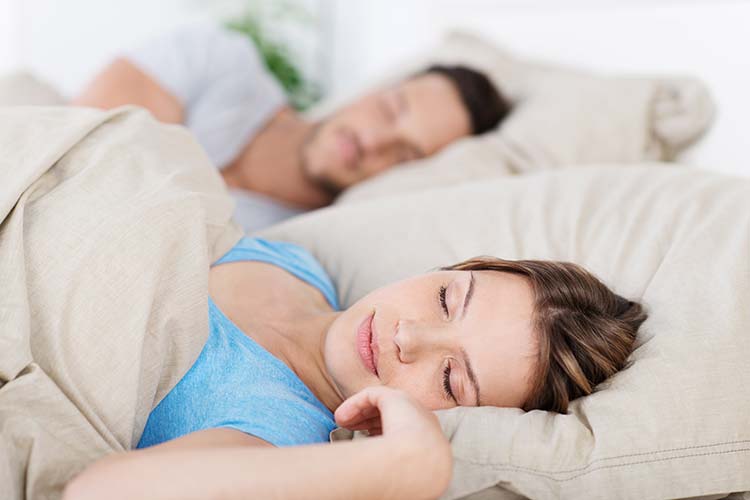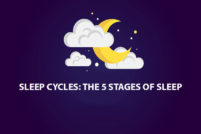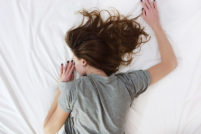Most living things — including animals, plants and even microbes — exhibit some form of circadian rhythm. [1]
These changes include: [2]
- Body temperature
- Heart rate
- Blood pressure
- Release of hormones
- Sleep-wake schedule
How Circadian Rhythms Work
What are Biological Clocks?
There are many “biological clocks” located throughout the body. These are groups of molecules within cells which control a variety of metabolic processes which are synchronized by the Master Clock. [3]
The Master Clock
The Master Clock is located deep within the brain, in the suprachiasmatic nucleus (SCN).
This bundle of nerve cells, found in the hypothalamus, is responsible for determining our circadian rhythm, and signals the different systems of the body to bring about all the corresponding changes. [4]
5 Factors That Influence Your Circadian Rhythms
Beyond light, your circadian rhythms are guided by a variety of other internal and external factors. [5]
- Exercise
- Diet
- Age
- Sleep Routine
- Medications
Our daily schedules — when we choose to eat our meals, or exercise — or artificial manipulations of our sleep-wake rhythm, such as waking up to an alarm or sleeping during the day to accommodate a night-shift at work, can cause our circadian rhythms to change.
Circadian Rhythms And Sleep

Sleep is regulated by two systems: sleep-wake homeostasis and our circadian rhythms. The former monitors the need for sleep which accumulates during waking hours, and determines the amount of sleep we need to be fully rested. [6]
Our circadian rhythms on the other hand dictate the sleep-wake schedule: the timing of when we feel sleepy, and when we feel awake.
While the exact timing depends on your chronotype (whether you’re an early bird or a night owl), generally speaking we are the most sleepy at 2-4 am, with a secondary period around 1-3 pm in the afternoon.
What is Melatonin and How Does it Affect Sleep?
Melatonin is a hormone produced under direction of our body clock. Its release is triggered when the eye signals the brain that light is depleting — that night is approaching.
As melatonin levels rise in the evening, it serves as a sign to other systems of the body that it is time to sleep. Melatonin continues to rise, peaking at about 2-4 am (when we are the most sleepy), and then gradually tapering off towards the morning.
Circadian Rhythm Disorders
Circadian rhythm disorders occur when our natural cycle becomes out of sync.
This can result from aging — as the pineal gland calcifies leading to a reduction in melatonin production [7] — or when demands from work, school or your social life get in the way of heeding your body’s signals.
1. Jet Lag
Jet lag is the most common circadian rhythm disorder, and is caused by traveling through many time zones (such as from US to Europe). [8]
Jet Lag Symptoms:
- Insomnia
- Daytime fatigue
- Irritability
- Indigestion
- Confusion
2. Shift Work Disorder
Working night shifts, or rotational shifts requires you to adapt to a sleep-wake schedule that doesn’t match your natural circadian rhythms. The symptoms are similar to jet lag, without ever leaving your time zone.
Additionally, day-time sleepers often get less sleep, and have more fragmented sleep than if they were to sleep during the night.
3. Delayed Sleep Phase Disorder (DSP)
DSP causes your sleep-wake schedule to be delayed by 2 hours or more. Those suffering from this condition are unable to fall asleep at “normal” time, instead heading to bed around 2am or later.
DSP is most common in young adults.
4. Advanced Sleep Phase Disorder (ASP)
Similar to DSP, ASP causes the sleep-wake schedule to shift hours ahead. People with ASP often get sleepy in the early afternoon and head to bed typically around 7-8 pm. Consequently, they wake up very early in morning.
ASP is more common in older adults.
5. Irregular Sleep-Wake Rhythm
If your sleep-wake schedule exhibits no predictable schedule, despite your efforts to adopt one, you may have irregular sleep-wake rhythm disorder.
People with this condition may head to bed at any time throughout a 24-hour period, often sleeping in a series of naps rather than one consolidated period.
6. Non 24-Hour Sleep Wake Disorder
This disorder typically affects those who are totally blind, due to missing the information from important light cues.
Usually, the shift begins little by little each day, until periods of sleeping and waking are completely out of sync with a day-night schedule.
People with this condition experience drastically reduced sleep time, daytime sleepiness, and interrupted sleep at night. [9]
A good nights rest is heavily dependent on a good mattress that supports your back. Here are our favorites – The Nectar, Amerisleep and Lucid as a more budget friendly option. Click here to read all of our mattress reviews and bed comparisons.
How to Improve Your Circadian Rhythms
Practicing good sleep hygiene can help you regulate your circadian rhythms.
By scheduling your daily activities with your circadian rhythms in mind, you can dramatically improve your sleep and resolve daytime sleepiness.
If issues with sleep continue and are interfering with your daytime responsibilities and negatively impacting your overall health, please consult your doctor.





